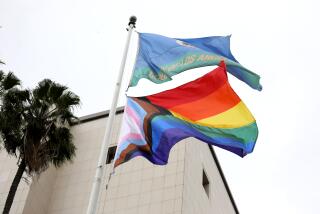Confederate-Flag Battle to Continue in S.C.
- Share via
COLUMBIA, S.C. — When South Carolina lowers the Confederate flag Saturday after 38 years atop the Statehouse, it will mark a victory for a loose coalition of churches, colleges, entertainers and businesses that had rallied against the banner.
“As far as we’re concerned, it brings finality to the issue,” said Deb Woolley, spokeswoman for the South Carolina Chamber of Commerce, one of the most influential flag opponents.
But the fight is far from over for the NAACP and groups who insist they’ll continue to boycott the state until no Confederate flag flies on the Capitol grounds. Though the flag is coming off the dome, a similar one will be raised at a nearby Confederate monument.
“The first response to our request was ‘Never.’ Then we’ve seen this movement from one position of sovereignty to another,” said Dwight James, executive director of the state chapter of the National Assn. for the Advancement of Colored People. “It’s all true to form in a South that’s resistant to change.”
The Confederate flag rose on the Statehouse dome in 1962 to celebrate the Civil War’s centennial. Some see the flag as a symbol of Southern heritage; others regard it a reminder of slavery and hate. South Carolina is the last state to fly the Confederate flag atop its Statehouse.
Even before the NAACP-organized tourism boycott of the state began Jan. 1, the Southern Conference became the first high-profile sports organization to ask lawmakers to move the flag.
It threatened that it would not award championships to its South Carolina members--the Citadel, College of Charleston, Furman and Wofford--without change. The conference has now decided to hold its soccer playoffs in Charleston.
Though not everyone was completely satisfied with the flag compromise, things “are better off today than when this whole exercise started,” Southern Conference commissioner Alfred White said. “The people of South Carolina are headed in the right direction.”
The NCAA also said it would not award championships or tournaments to South Carolina schools unless the flag came down. In April, the group’s executive committee set an Aug. 11 deadline for the flag’s removal but said a month later it was pleased with the state’s actions.
The NAACP has said its expanded sanctions could target the state’s burgeoning film industry, for example. But finding broad support to continue the fight will be difficult, said Rick Silver, partner in a Columbia public-relations firm who helped lead one of several anti-flag organizations that sprang up in the past year. “Most people just wanted to see some resolution, some change,” he said.
More to Read
Sign up for Essential California
The most important California stories and recommendations in your inbox every morning.
You may occasionally receive promotional content from the Los Angeles Times.










